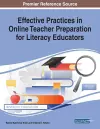
Effective Practices in Online Teacher Preparation for Literacy Educators
2 contributors - Paperback
£164.00
Rachel Karchmer-Klein is an associate professor of Literacy Education at the University of Delaware where she teaches courses in literacy and educational technology at the undergraduate, graduate and doctoral levels. A former elementary classroom teacher and reading specialist, she earned her Ph.D. in Reading Education at Syracuse University. Dr. Karchmer-Klein joined the faculty at UD in 2003, where her research has focused on the relationships between internet technologies and reading and writing, with particular emphasis on the practical implications of technology use in K-12 education. Her work has been published in journals such as Reading Research Quarterly, The Reading Teacher, Journal of Research in Reading, and Journal of Research on Technology in Education. She recently completed her terms as an elected member of the Board of Directors for the International Literacy Association and as the Publications Chair for the Literacy Research Association. She provides professional development to K-12 teachers and university faculty across the country in the areas of online course design, iPad integration, multimodal composition, and digital navigation. Dr. Karchmer-Klein taught her first online course in 2003 and has continued to design hybrid and 100% online courses ever since. She serves as the coordinator for and advisor of the M.Ed. in Teacher Leadership and the M.Ed. in Literacy programs in the UD School of Education.
Kristine E. Pytash is an Associate Professor in Teaching, Learning and Curriculum Studies at Kent State University's College of Education, Health, and Human Services where she co-directs the secondary Integrated Language Arts teacher preparation program. Her research focuses on the literacy practices of youth in alternative schools and juvenile detention facilities. In addition, she studies disciplinary writing and how to prepare teachers to teach writing. An underlying theme across all her lines of inquiry is how technology significantly influences young adults' literacy practices and their literacy instruction.